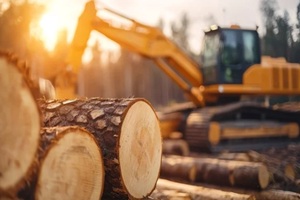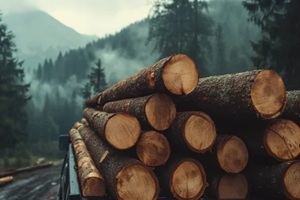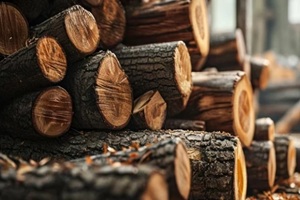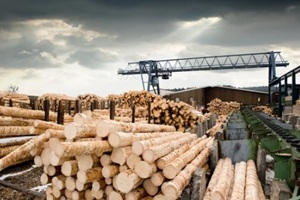
The timber industry is at the heart of Virginia’s economy. But, for those working in it, the line between forestry and logging often blurs. And when it comes to insurance, that can lead to serious problems. In this high-risk field, logging crews deal with heavy equipment, steep terrain, and physical hazards. Forestry professionals manage land, oversee controlled burns, and make decisions with long-term financial impact. In either case, one misstep can lead to injury, liability, or a major financial loss.
This article explains the primary differences between logging and forestry insurance and why having the wrong policy can cost more than you think.
Defining the Work: Logging vs. Forestry
The terms logging and forestry are often used interchangeably when discussing the timber industry. But those who work in either sector know they are not the same thing. What’s the difference?
Logging
Logging is hands-on work. It involves physically cutting, moving, and processing trees. A typical logging business might include:
- Felling crews
- Skidder operators
- Timber haulers
- Sawmills that source their own logs
Forestry
Forestry, on the other hand, focuses on land and resource management. This involves planning timber harvests, guiding reforestation projects, evaluating the long-term health of forests, and setting up prescribed burns.
Forestry professionals include:
- Consulting foresters
- Silviculture specialists
- Reforestation contractors
- Land managers and conservation planners
Overlap Between Logging and Forestry
Those who work in logging and forestry in Virginia typically wear more than one hat. A logger may help landowners plan a harvest, and a consultant might oversee cutting.
However, most businesses operate heavily in one sector or the other, meaning the insurance distinction matters.
A policy built for a feller buncher crew will not cover a consultant running GIS mapping and burn planning. Each endeavor has particular risks, so the necessary insurance coverage differs based on the specific tasks performed.
What is Logging Insurance?

Logging insurance is for businesses that physically harvest, haul, or handle timber. Logging operations involve dangerous equipment, difficult terrain, unpredictable weather, and tight production schedules. These factors require insurance that fits the high-risk nature of the business.
What Logging Insurance Covers
- General Liability covers third-party injuries and property damage. For example, a falling tree hits something that it should not.
- Logging Equipment Coverage is for specialized gear, including feller bunchers, skidders, loaders, and chainsaws.
- Commercial Auto/Trucking covers log trucks, pickups, and other vehicles used to move timber and gear. These policies often include liability and physical damage.
- Inland Marine protects tools and equipment that are in transit or used off-site.
- Timberland Liability covers environmental impact or accidental damage while working on private land.
Why It Matters
The logging sector has a high risk of injury, equipment failure, or accidents that cause property damage. Consequently, insurance carriers look closely at the safety history of the business as well as the equipment maintenance, crew training, and more. If you are operating saws or hauling 80,000 pounds of logs down a Blue Ridge back road, your policy has to be as rugged as your rig.
What is Forestry Insurance?
Forestry insurance protects consultants, land managers, and others in timber planning and forest stewardship. Their work revolves less around chainsaws and log loaders than on site assessments, documentation, and environmental oversight; yet, that does not mean there is less risk.
What Forestry Insurance Covers
- Professional Liability (E&O) covers advisory mistakes that result in a client suffering a financial loss, such as marking a timber stand incorrectly or failing to account for buffer zones.
- General Liability covers third-party injury or damage, such as if a landowner trips over your equipment during a site visit.
- Property and Tools Coverage covers damage or loss of hand tools, drones, laptops, and field equipment.
- Workers’ Comp covers the employees of a business for job-related injuries, including slip-and-fall accidents, falls from heights, injuries caused by falling objects, and other unexpected events.
- Prescribed Burn Coverage is an optional, add-on, liability coverage for controlled burns that do not go as planned.
Why It Matters

Forestry operations involve advice, planning, and long-term land care. The most significant risk is often not physical damage but liability for a professional error or a misjudgment that leads to financial loss or ecological harm.
Getting the Right Policy
When working in logging or forestry, having the wrong insurance can do more harm than good. You might pay for coverage that does not apply, or (even worse), the insurer might deny your claim when you need it most.
Here are other reasons why having the right insurance matters:
Misclassification Can Be Costly
If your policy classifies your business as logging when you mainly do consulting work, it may not cover professional liability. Conversely, if you are cutting timber but your policy says, “forestry services,” your insurance may not cover an equipment accident.
Overpaying or Being Underinsured
With a one-size-fits-all policy, you may pay for coverage you do not need. You could also be underinsured, missing valuable protection.
When You Might Need Both Logging & Forestry Insurance
Some businesses engage substantially in logging and forestry. If your work straddles both areas, it is possible (and wise) to carry coverage that reflects both sides of your operation.
For example:

- Dual-service operations: If you log and consult, you likely need both types of protection.
- Subcontractors: If your work varies seasonally, you might need a more flexible plan.
- Year-round companies: Many operations in Virginia do forestry work in spring/summer and switch to cutting in the colder months.
A flexible insurance broker that specializes in logging and forestry insurance can bundle policies or structure hybrid plans to keep you covered, whether you are cutting, consulting, or doing both.
Contact Burton & Company to Get the Right Coverage for the Work You Do
Logging and forestry may happen on the same land but require different insurance strategies. Whether you fell trees, haul timber, or guide landowners on forest health, your policy should accurately reflect everything you do.
Are you looking for specialized logging insurance or forestry coverage in Virginia?Logging insurance and forestry insurance are not interchangeable, and trying to fit your business into the wrong box could cost you a lot. Contact Burton & Company today for an insurance policy that matches your business.

